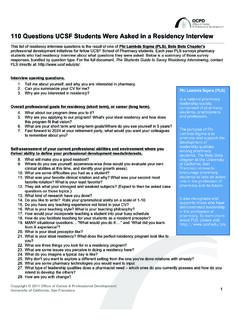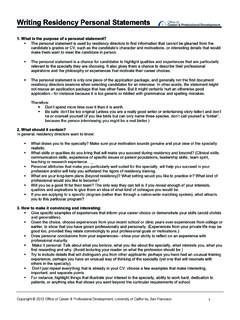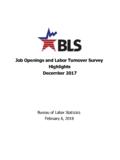Transcription of Negotiating Your Start Up Package - UCSF Career
1 Negotiating your Start Up Package What is covered in this handout? Overall Principles: .. 1. Start -up Funds and Space: .. 1. Salary and compensation: .. 3. The Negotiation Process: .. 4. Suggested reading: .. 7. Overall Principles: What goes into an overall Package ? What might I expect to negotiate for? Start -up funds and space General support from department or institution Salary/compensation, health/retirement (in some cases), other benefits All items and customs vary widely by institution Know what you MUST have BEFORE you interview You can be more aware during interview process You will ask more intelligent questions of future colleagues (vs.)
2 Chair) during the interview Gather some information during the interview Ask about typical situations.. Do NOT discuss your own specific needs until you have an offer (see The Negotiation Process , below). Get a sense for what cannot be negotiated (what might be simply out of the control of the chair). Advice from prior panelists: Don't negotiate for the sake of Negotiating . But DO make sure you'll have what you need to succeed.. Ron Vale, Chair, Dept of Cellular & Molecular Biology (2004-2009), UCSF. Start -up Funds and Space: Know the stats*. Average startup costs for new Asst. Professor, Biology Private Research 1 University = $403,071. Public Research 1 University = $308,201.
3 High-end startup costs for new Asst. Professor, Biology Private Research 1 University = $437,927. Public Research 1 University = $430,270. Source: Reed Science Group Academic Sourcebook, November 2005; Cornell Higher Education Research Institute, Survey of Start -up Costs and Laboratory Space Allocation Rules Copyright 2012 Office of Career & Professional Development, University of California, San Francisco *NOTES: Numbers for the types of institutions above vary widely. Startup costs at teaching-focused institutions can be 1/10 or less of the above amounts. Startup budgets are typical for academic institutions, but may not be for other countries.
4 For example, in some European countries it is standard for new faculty to be very successful at getting grants. Therefore, an individual institution may not offer any startup budget for research. (This packet provides tips specific to the Other aspects of negotiation may also be very different in other countries.). How are Start -up funds structured? Lump sum? Funded exactly from your submitted detailed list? Typically 4 categories: reagents, equipment, staff, research support Key: Get enough to cover your costs until you generate another revenue stream. Boss & Eckert Enough: Reagents Equipment expensive one time cost; you may need to share the equipment Staff recurring cost, so most difficult to negotiate; one student, one postdoc, one technician could exceed $150,000/year Until: How long will funds be available?
5 3 yrs? 5 yrs? Do you have discretion on the per-year amount that you will spend? If you get a grant, do you immediately lose your startup funding? General Research Support from Department or Institution Examples of support you may be able to request from the department/institution (instead of covering them through your own grants): Administrative/clerical support grant writing support, other writing support, teaching prep, dealing with new hires Students/postdocs funded by departmental training grants Core facilities and shared research equipment/resources Office space, support, photocopying Computers and software Travel support Submission and publication fees (can be $3000+ per year).
6 Lab Space Space is money (electricity, etc. have a cost associated with them). Negotiating for space can be difficult, and may involve the department moving around other investigators, or asking to barter space from other departments. Be sensitive to these issues. Quantity, quality and location are all important Ask about: Condition of lab space Fit to your program Renovations needed Location/neighbors (this may be more important than quantity of space!). Copyright 2012 Office of Career & Professional Development, University of California, San Francisco Space in animal facilities 400 1000 sq ft is typical Boss & Eckert Try to get the space agreement written into the official offer.
7 Sometimes this can be difficult. Even if it's in writing, don't assume the space is yours until you're there. If possible, try to go see the space yourself. If it's empty, then that's a good sign! If the space is not ready, ask is it really realistic to expect ___ to retire? (etc.). Equipment List You may be asked to provide an equipment list as early as the interview process. Make a detailed list in a spreadsheet; borrow other recent candidates' lists as an example. Share a summary of this detailed list (no more than 1 page). For example, cluster into Consumables , Small equipment . List high-cost items explicitly within your budget summary: you may be asked why these are important, what alternatives (if any), and whether you can share with another investigator.
8 Salary and compensation: Doctoral Institutions th th th th th 95 80 60 40 20. Professor $161,179 $132,969 $118,809 $109,662 $97,807. Assoc professor $105,606 $93,074 $84,560 $78,488 $72,517. Asst professor $88,610 $78,886 $71,565 $66,642 $61,838. Master's Institutions th th th th th 95 80 60 40 20. Professor $115,553 $98,485 $89,231 $81,38 $74,062. Assoc professor $88,058 $76,639 $69,798 $65,419 $60,595. Asst professor $73,044 $65,381 $58,859 $55,285 $52,116. Baccalaureate Institutions th th th th th 95 80 60 40 20. Professor $120,125 $92,311 $79,853 $71,534 $61,690. Assoc professor $87,682 $72,361 $63,957 $58,353 $52,755. Assistant professor $70,990 $60,584 $53,978 $49,612 $45,757.
9 Adjusted for 9-month salary period. Data from Chronicle of Higher Education/AAUP Survey, 2008-9. Does not include faculty at Medical Schools, see AAMC survey Medical Schools MD/Basic MD/Clinical PhD/Basic PhD/Clinical Professor $183,000 $249,000 $148,000 $154,000. Assoc professor $120,000 $216,000 $102,000 $109,000. Assistant professor $84,000 $181,000 $82,000 $82,000. AAMC Report on Medical School Faculty Salaries, 2007-08. Salaries are reported for 12-month basis Salary structure may be very complex! Copyright 2012 Office of Career & Professional Development, University of California, San Francisco 9-month vs. 12-month structure Base salary may vary widely in large univ system Scale, rank, step UCSF Asst Prof, Step 1, Scale 1 = ~$61K.
10 UCSF Asst Prof, Step 6, Scale 9 = ~$181k Salary tables for UCSF and UC see Plus add-ons at many institutions At UC: X factor = base salary depends on dept's scale , may be the same for all in dept at rank and seniority Y factor = compensation paid in addition to the base salary; negotiated depending on such factors as the quality, scope, and volume of a faculty member's teaching, research, clinical and administrative activities Z factor = incentive compensation or bonus; based on service to dept, or outside income. Other items that might be negotiated: Personal: Salary and compensation Parking Moving expenses Salary advance Housing assistance Spouse/partner appointments or other House-hunting visit dual- Career couple issues Day care Individual institutional issues Summer salary support Release time Teaching load requirements; teaching assistants Service requirements Tenure clock, contract renewal dates, Start date Graduate program affiliations The Negotiation Process: Step 1: Receive the job offer; respond intelligently.










